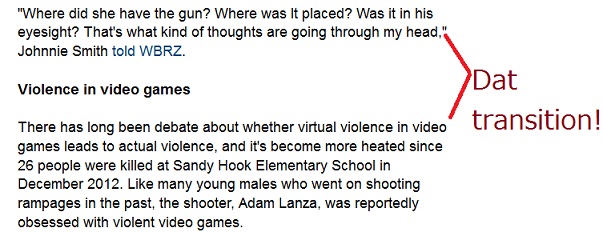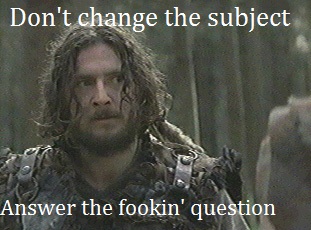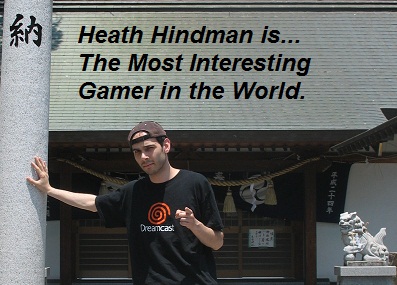Have you heard this news? Guns don't kill people, people don't kill people, but it turns out that video games kill people. In Louisiana this past weekend, an 8-year-old boy grabbed a gun, then shot and killed his elderly caretaker. Right within the body of the Sky News report, it says this:
Neighbour Johnnie Scott said: "Where did she have the gun? Where did he see the gun, was it in his eyesight? That's the thought that goes through my head."



Media has an undeniable impact on people's thoughts, words, and actions. It's a huge part of any modern culture. You might not think it affects your behavior, but testifying to the contrary is every single time you've ever quoted, remembered, had a dream about, or taken a picture in reference to a movie, TV show, or game. Ever sung a three-sentence parody of a song? There it is. Some of you out there have dressed up as a character from a game or comic book, and that counts too. The clothes that sell are the clothes the movie stars and musicians wear. There's a foundation for the assumption that games are in some way responsible for some untimely deaths, but unfortunately for, well, everyone, that's where it begins and ends: the foundation.
To take this assumption any further is to see it crumble. Kids are indeed young and impressionable, and we've therefore implemented ratings systems in virtually every territory worldwide. In the United States, where this most recent story happened, the shooter was only age 8, yet he played a game rated "M" for "Mature" not to be sold to anyone under 17 due to its graphic content. If you're reading this article on GameRevolution, I probably don't need to tell you how stupid it is that an 8-year-old was given access to this game. I wonder if his caretakers also offer him whiskey and a pack of cigs after a hard day at school, and read bedtime stories out of Penthouse Letters? Some things are made only for adults and are labeled as such because they can have adverse effects on young, under-developed minds and bodies (or in the case of the drugs, worse effects).
This is all aside from the fact that media influence takes time to set in. When a kid sees something for the very first time, it can be awe-inspiring, interesting, hilarious, scary, or any number of adjectives, but the human mind needs time and repetition to be influenced into involuntary behavior. Kids don't see something on TV and then immediately turn around and start mimicking it. No, that needs time to sink in. Just as important in turning a kid's brain to mush is repetition. A child will generally need to see something several times before imitated behavior comes out. But the news writeups from Sky and CNN make it sound like the boy played GTA for the first time and immediately said, "Holy sweetshitfuck, I have to shoot someone and I have to do it now!"
This raises another question: How often did this kid play Grand Theft Auto? What other violent games has he played? What kind of TV shows and movies does he watch? What kind of music do his parents play around him, or allow him to listen to?

All valid questions, none being addressed in the news. It takes time to gather information, but a proper report should at least mention the idea that other factors have not yet been investigated.
An unfortunate reality of this situation is that our efforts to change the tone of such conversations will take years to make an impact. Comments within the news stories themselves and letters to the editor will, admittedly, only do so much. It's important to call people out (and CNN has heard from me about this story), but it's gonna take years to see any change in these discussions. To my satisfaction, I couldn't find this story on MSNBC or Fox News; they're either late to the party, or have decided this story unfit for print. If it's that latter, that's a victory here. Games are still the new kid on the block compared to movies, magazines, music, and TV. The older generations undoubtedly still don't understand them, and may in some cases outright refuse to do so. Hopefully, as time goes by, people will start focusing on effective parenting rather than strategies to win The Blame Game.
True fact: I even said all of this as a gun owner, my friends. (I owned a pistol when I lived in America.)







